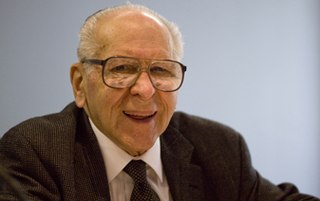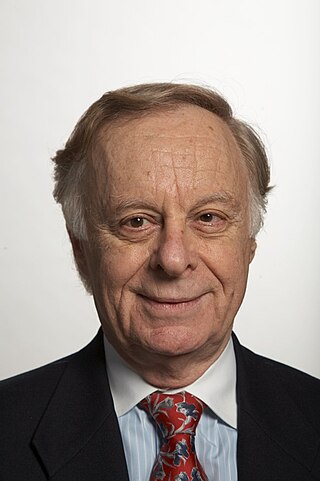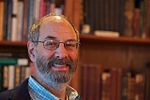
Carl Gustav Jung was a Swiss psychiatrist and psychoanalyst who founded analytical psychology. He was a prolific author, illustrator and correspondent.

Thomas Stephen Szasz was a Hungarian-American academic and psychiatrist. He served for most of his career as professor of psychiatry at the State University of New York Upstate Medical University in Syracuse, New York. A distinguished lifetime fellow of the American Psychiatric Association and a life member of the American Psychoanalytic Association, he was best known as a social critic of the moral and scientific foundations of psychiatry, as what he saw as the social control aims of medicine in modern society, as well as scientism.

Paul Eugen Bleuler was a Swiss psychiatrist and humanist most notable for his contributions to the understanding of mental illness. He coined several psychiatric terms including "schizophrenia", "schizoid", "autism", depth psychology and what Sigmund Freud called "Bleuler's happily chosen term ambivalence".

Analytical psychology is a term coined by Carl Jung, a Swiss psychiatrist, to describe research into his new "empirical science" of the psyche. It was designed to distinguish it from Freud's psychoanalytic theories as their seven-year collaboration on psychoanalysis was drawing to an end between 1912 and 1913. The evolution of his science is contained in his monumental opus, the Collected Works, written over sixty years of his lifetime.

Arnold Mindell is an American author, therapist, and teacher in the fields of transpersonal psychology, body psychotherapy, social change, and spirituality. He is known for extending Jungian dream analysis to body symptoms, promoting ideas of 'deep democracy,' and interpreting concepts from physics and mathematics in psychological terms. Mindell is the founder of process oriented psychology, or process work, a development of Jungian psychology influenced by Taoism, shamanism, and physics.
Countertransference, in psychotherapy, refers to a therapist's redirection of feelings towards a patient or becoming emotionally entangled with them. This concept is central to the understanding of therapeutic dynamics in psychotherapy.
Arthur Michael Kleinman is an American psychiatrist, social anthropologist and a professor of medical anthropology, psychiatry and global health and social medicine at Harvard University.
Depth psychology refers to the practice and research of the science of the unconscious, covering both psychoanalysis and psychology. It is also defined as the psychological theory that explores the relationship between the conscious and the unconscious, as well as the patterns and dynamics of motivation and the mind. The theories of Sigmund Freud, Carl Gustav Jung, and Alfred Adler are all considered its foundations.
Richard A. Isay was an American psychiatrist, psychoanalyst, author and gay activist. He was a professor of psychiatry at Weill Cornell Medical College and a faculty member of the Columbia University Center for Psychoanalytic Training and Research. Isay is considered a pioneer who changed the way that psychoanalysts view homosexuality.
Andrew Samuels is a British psychotherapist and writer on political and social themes from a psychological viewpoint. He has worked with politicians, political organisations, activist groups and members of the public in Europe, US, Brazil, Israel, Japan, Russia and South Africa as a political and organisational consultant. Clinically, Samuels has developed a blend of Jungian and post-Jungian, relational psychoanalytic and humanistic approaches.
Carl Alfred Meier was a Swiss psychiatrist, Jungian psychologist, scholar, and first president of the C. G. Jung Institute in Zürich. As a successor to Carl Jung, he held the Chair of Honorary Professor of Psychology at the Swiss Federal Institute of Technology in 1949. Later, co-founded the Clinic and Research Center for Jungian Psychology in Zürichberg.
Anthony Stevens was a British Jungian analyst, psychiatrist and prolific writer of books and articles on psychotherapy, evolutionary psychiatry and the scientific implications of Jung's theory of archetypes.

Cults: Faith, Healing and Coercion is a non-fiction book on cults and coercive persuasion, written by Marc Galanter. The book was published in hardcover format in 1989 by Oxford University Press, and again in hardcover in 1999 in a second-edition work. The second edition was reprinted by Oxford University Press in March 2007.
Donald Eric Capps was an American theologian and William Harte Felmeth Professor of Pastoral Theology at Princeton Theological Seminary.

Edward Adamson was a British artist, "the father of Art Therapy in Britain", and the creator of the Adamson Collection.
Linda Fierz-David (1891–1955) was a German philologist and one of the first Jungian analysts in Zurich. She was the first woman admitted to the University of Basel, where she studied German philology. She met Carl Jung in 1920, becoming one of his first pupils and closest friends. She collected rare books and studied psychology, anthropology, mythology and literature.

Henry Zvi Lothane is a Polish-born American psychiatrist, psychoanalyst, educator and author. Lothane is currently Clinical Professor at Icahn School of Medicine at Mount Sinai, New York City, specializing in the area of psychotherapy. He is the author of some eighty scholarly articles and reviews on various topics in psychiatry, psychoanalysis and the history of psychotherapy, as well as the author of a book on the famous Schreber case, entitled In Defense of Schreber: Soul Murder and Psychiatry. In Defense of Schreber examines the life and work of Daniel Paul Schreber against the background of 19th and early 20th century psychiatry and psychoanalysis.

Michael Alan Schwartz is an American academic and psychiatrist based in Weston, Connecticut. In 2018 Schwartz retired as clinical professor of psychiatry and joint professor of humanities in medicine at the Texas A&M School of Medicine. He continues practicing psychiatry as well as writing and editing psychiatric books and articles. His work focuses on advancing pluralistic, person and people-centered approaches to psychiatric assessment, care and treatment.
Stanton Marlan, Ph.D., ABPP, FABP is an American clinical psychologist, Jungian psychoanalyst, author, and educator. Marlan has authored or edited scores of publications in Analytical Psychology and Archetypal Psychology. Three of his more well-known publications are The Black Sun. The Alchemy and Art of Darkness, C. G. Jung and the Alchemical Imagination, and Jung's Alchemical Philosophy. Marlan is also known for his polemics with German Jungian psychoanalyst Wolfgang Giegerich. Marlan co-founded the Pittsburgh Society of Jungian Analysts and was the first director and training coordinator of the C. G. Jung Institute Analyst Training Program of Pittsburgh. Currently, Marlan is in private practice and serves as adjunct professor of Clinical Psychology at Duquesne University, Pittsburgh, Pennsylvania, USA.
Adolf Guggenbühl-Craig was a Swiss psychiatrist and analytical psychologist, member of the archetypal school of Jungian analysis. He was the author of many publications.








